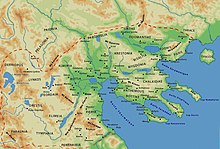Perrebët

Perrebët [1] ose Peraebët (greqishtja e vjetër: Περραιβοί ) ishin një fis fis iliro - pellazg, të cilët sipas mitologjisë ishin pasardhës të Perrebit, bir i Ilirit dhe nip i Polifemit dhe Galateas përkatësisht Kadmit dhe Harmonias. Perrebët banonin në pjesën veriore të Thesalisë së Lashtë si dhe në një pjesë të Maqedonisë së Lashtë. [2] [3]
Historia
[Redakto | Redakto nëpërmjet kodit]Vendbanimi i tyre njihej si Perebia ose Peraebia (në greqishten e vjetër : Περραιβών), dhe kryeqyteti i tyre ndodhej në vendin e Elasonës së sotme. Territori i tyre mbulonte vendin nga Malet e Pindit deri në Osa në lindje dhe nga Penei deri në Maqedoninë e lashtë në veri.
Perrebët morën pjesë në amfiksionin thesalian me dy vota. Vendi i tyre u pushtua dhe iu aneksua Maqedonisë së Lashtë nga Filipi II i Maqedonisë, me një status quo që mbeti deri në pushtimin e tyre nga romakët në vitin 196.pes.
Homeri i përmend ata si pjesëmarrës në Luftën e Trojës ndërsa Herodoti - i përmend si pjesëtarë të ushtrisë së Kserksit I. [4]
Shih edhe
[Redakto | Redakto nëpërmjet kodit]Burimet
[Redakto | Redakto nëpërmjet kodit]- ^ Straboni 9, 5, 19 (Anglisht).
- ^ The Oxford Classical Dictionary by Simon Hornblower and Antony Spawforth, 2003, ISBN 0-19-860641-9, page 1142, „Perhhaebi, a tribe occupying a district on the northern border of Thessaly and commanding passes from Macedonia. Although most of their country was mountainous and sparsely inhabited their principal towns Olooson the tribal capital and Phalanna were situtated in fertile plains. Neither however played any signifigant role in history. The Perrhaebi who had been thrust northwards by the invading Thessalians were reduced to the status of perioikoi...“
- ^ Harry Thurston Peck, Harpers Dictionary of Classical Antiquities (1898), (Perraiboi) and Peraebi (Peraiboi). A powerful and warlike Pelasgic people in the north of Thessaly. Homer places the Perrhaebi in the neighbourhood of the Thessalian Dodona and the river Titarosius; and at a later time the name of Perrheabia was applied to the district bounded by Macedonia and the Cambunian Mountains on the north, by Pindus on the west, by the Peneus on the south and southeast, and by the Peneus and Ossa on the east. The Perrhaebi were members of the Amphictyonic League.
- ^ Herodotus, The Histories, 7.185.1, CLXXXV. I must, however, also take into account the force brought from Europe, and I will rely on my best judgment in doing so. The Greeks of Thrace and the islands off Thrace furnished one hundred and twenty ships, and the companies of these ships must then have consisted of twenty-four thousand men. As regards the land army supplied by all the nations--Thracians, Paeonians, Eordi, Bottiaei, Chalcidians, Brygi, Pierians, Macedonians, Perrhaebi, Enienes, Dolopes, Magnesians, Achaeans, dwellers on the coast of Thrace--of all these I suppose the number to have been three hundred thousand. When these numbers are added to the numbers from Asia, the sum total of fighting men is two million, six hundred and forty-one thousand, six hundred and ten.
